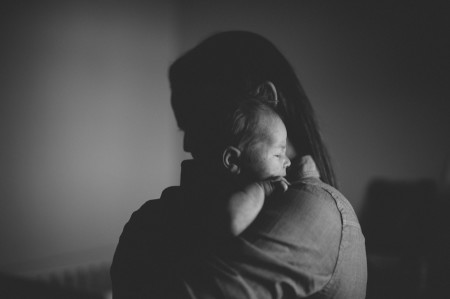I remember the wonder I felt when my son Joel was a tiny newborn and I realized just my presence could comfort him. He would cry. I would pick him up. He would stop crying. It seemed like a miracle to me. I hadn’t done anything special, hadn’t started singing a soothing lullaby or offered him a bottle, I had just picked him up and he was at peace. I felt just as startled when my son Teddy was a week old and was crying while I put him down for a minute so I could get dressed. I called out to him, “It’s okay! Mommy is here!” and he stopped crying. It was so odd to me that just the sound of my voice could reassure him he was safe.

All photos by Love Equals Photography
I imagine other mothers may not be as surprised to find they are capable of comforting their children. Other mothers may even expect their babies will quiet when they are picked up or will be soothed by hearing their mother’s voice. Probably because other mothers weren’t initiated into this whole parenting gig via adoption and foster care.
Joel and Teddy are the sons I grew in my body. They heard my voice for 40 weeks. They know my heartbeat, the way I pace the floor when I’m on the phone, the arguing voices of their siblings, the way the dog barks when someone knocks at the door. These boys know my smell, my sounds, my rhythm. They are hardwired to trust me and in some ways it takes minimal effort to establish that I am trustworthy.
This is not the case when you are a stranger to the child you love. I have spent long hours bouncing a baby who was terrified of me– a white face when he had only known brown. I have fed a baby who only felt safe enough to eat when she was turned away from me because she wasn’t used to being held while she ate. I have loved children who spent their prenatal lives being subjected to toxic substances, listening to the sounds of domestic violence happening around them, or the cold sterile noises of prison life. They have been programed to love and trust someone who ended up being untrustworthy and they fear the love of the stranger doing the midnight feedings and changing their diapers. When they cry and you pick them up, they are not comforted.
It is a long process to establish trust. It means being a calm presence to a frightened child. It means putting aside your desire to be liked or to have your love reciprocated. It may mean days or weeks or months of being the only one to meet that child’s needs so they learn you are the one they can trust. It may not come simply or naturally or easily. But when it does come, it is overwhelmingly beautiful.
The first time that child falls asleep in your arms or gazes into your eyes while you feed them or comes to you for a hug when they’re scared, it is a feeling of joy and accomplishment that is uniquely special. Being trusted by your foster or adopted child is not something that was just naturally given to you, it was something you earned through all the hours of love and consistent care you invested in this child.
But in the case of foster children, why do you want them to learn to trust you if eventually they will have to leave you? It’s a question every foster parent struggles with. I do all the work, but eventually I will be untrustworthy too, when a judge decides this child should leave my home. Is it worth all the work? Will I end up hurting this child more by creating an attachment that has to be severed?
. . . To finish reading, click over to the full text on Her View From Home. . .


2 Comments
Leave a reply →